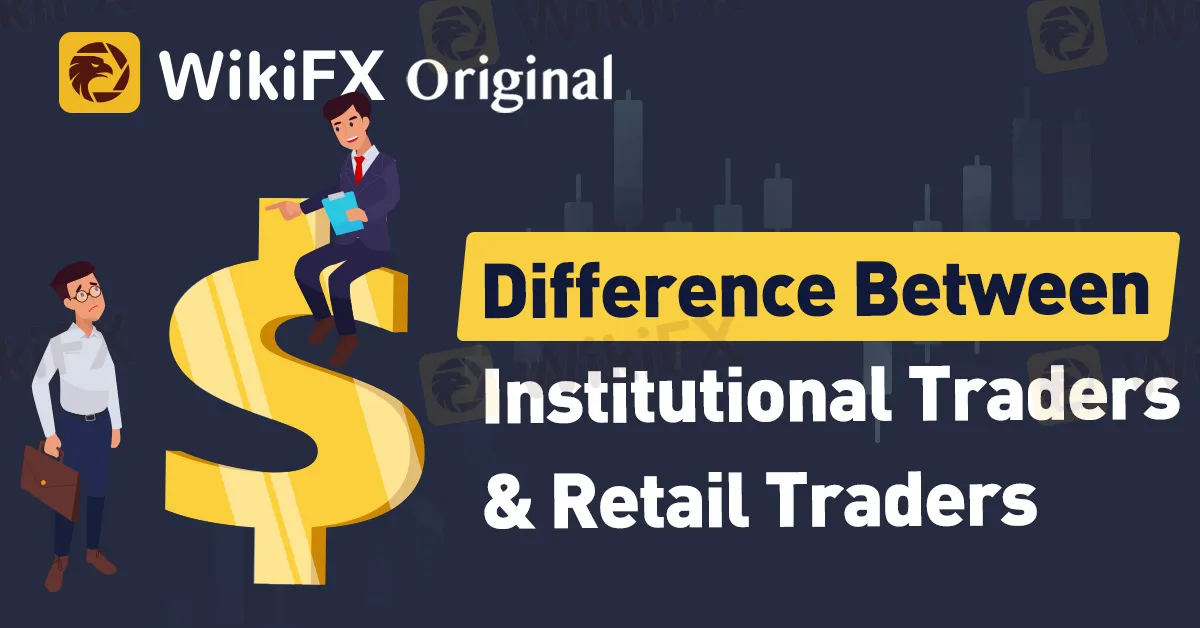简体中文
繁體中文
English
Pусский
日本語
ภาษาไทย
Tiếng Việt
Bahasa Indonesia
Español
हिन्दी
Filippiiniläinen
Français
Deutsch
Português
Türkçe
한국어
العربية
Difference Between Institutional Traders & Retail Traders
Abstract:The article explores the differences between institutional traders and retail traders, highlighting their unique advantages, access to securities, and potential paths of transition between the two.

The world of securities trading encompasses a spectrum of approaches, from the simplicity of retail trading to the complexities of institutional trading. Retail traders, often individuals, engage in personal securities transactions, while institutional traders manage accounts for groups or institutions such as pension funds, mutual fund families, insurance companies, and ETFs.
Although advancements in technology and access to information have narrowed the advantages once held by institutional traders, certain distinctions remain. Institutional traders still enjoy access to a wider range of securities, the ability to negotiate fees, and assurances of best price and execution.

Institutional traders can delve into complex transactions like forwards and swaps that are typically beyond the reach of retail traders. Moreover, institutions are often presented with investment opportunities in IPOs and can negotiate basis point fees while avoiding marketing or distribution expenses.
Given their substantial trading volume, institutional traders possess the power to significantly impact the share price of a security. To mitigate this influence, they may split trades among various brokers or execute them over time.
The size of an institutional fund influences the market capitalization of the securities it owns, with larger funds generally favoring higher-cap stocks. Smaller-cap stocks pose challenges for institutional traders as their investment might result in majority ownership or reduced liquidity due to limited counterparty participation.

Retail traders primarily engage in stocks, bonds, options, and futures, with limited access to IPOs. They typically trade in round lots, although the flexibility to trade any number of shares exists. Retail traders may encounter higher trading costs if they utilize brokers with flat fees per trade along with marketing and distribution expenses. Given the relatively smaller number of shares they trade, retail traders have minimal impact on security prices.
Unlike institutional traders, retail traders are more inclined to invest in small-cap stocks due to their affordability, facilitating diversified portfolios comprising multiple securities.
Interestingly, retail traders often transition into institutional traders. Starting with personal trading accounts, successful retail traders may expand their scope to include trades for friends and family. Continued success and the accumulation of capital from other investors can lead to the establishment of a small investment fund, paving the way for the transformation into institutional traders.
While institutional traders and retail traders have distinct characteristics, their paths can intertwine as retail traders progress towards managing institutional-level portfolios, exemplifying the evolutionary nature of the trading landscape.

Disclaimer:
The views in this article only represent the author's personal views, and do not constitute investment advice on this platform. This platform does not guarantee the accuracy, completeness and timeliness of the information in the article, and will not be liable for any loss caused by the use of or reliance on the information in the article.
Read more

The Daily Habits of a Profitable Trader
Every professional trader follows a structured approach to ensure they are well-prepared, disciplined, and able to seize opportunities with confidence. Whether you are a seasoned investor or an aspiring trader, adhering to a robust daily checklist can significantly enhance your performance. Use this checklist to check if you are a qualified trader

How a Housewife Lost RM288,235 in a Facebook Investment Scam
A 47-year-old housewife in Malaysia recently fell victim to an online investment scam, losing a substantial sum of RM288,235 after engaging with a fraudulent scheme advertised on Facebook.

A Trader’s Worst Mistake: Overlooking Broker Reviews Could Cost You Everything
In today’s digital age, reviews influence nearly every decision we make. When purchasing a smartphone, television, or home appliance, we pore over customer feedback and expert opinions to ensure we’re making the right choice. So why is it that, when it comes to choosing an online broker where real money and financial security are at stake many traders neglect the crucial step of reading reviews?

Interactive Brokers Launches Forecast Contracts in Canada for Market Predictions
Interactive Brokers introduces Forecast Contracts in Canada, enabling investors to trade on economic, political, and climate outcomes. Manage risk with ease.
WikiFX Broker
Latest News
The Withdrawal Trap: How Scam Brokers Lure Victims into Paying More
FCA to Investors: Think Twice Before Trusting These Brokers
Trump\s tariffs: How could they affect the UK and your money
Trump gambles it all on global tariffs he\s wanted for decades
TradingView Brings Live Market Charts to Telegram Users with New Mini App
Trump tariffs: How will India navigate a world on the brink of a trade war?
Interactive Brokers Launches Forecast Contracts in Canada for Market Predictions
Authorities Alert: MAS Impersonation Scam Hits Singapore
Stocks fall again as Trump tariff jitters continue
IG Group Acquires Freetrade for £160M to Expand UK Investment Market
Currency Calculator







